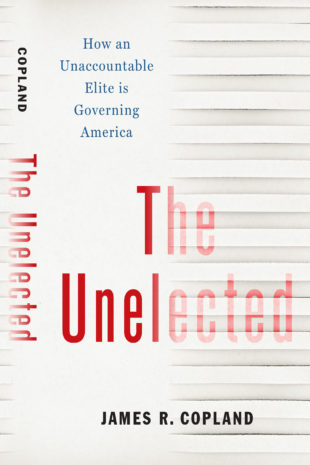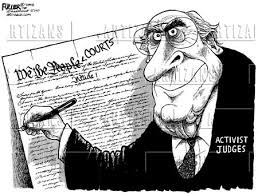America’s Ruling Class
This essay first appeared in Law & Liberty, on September 8, 2020 (here). Thanks to Power Line, Instapundit (here), and Real Clear Policy!

Some excellent books have been written on the separate—and seemingly unrelated–issues of taming the administrative state, reforming our civil justice system, reducing the discretion of prosecutors who wield enormous power due to the over-criminalization of behavior, and bemoaning the growing trend of state and local officials who attempt to dictate national policy. In his ambitious new book, The Unelected, Manhattan Institute senior fellow James Copland combines those topics under the general theme of documenting “how an unaccountable elite is governing America”—a phrase that serves as the book’s subtitle. This is a timely subject, deeply rooted in the principles of representative self-government, and one that is vital to the future of the United States as a constitutional republic subject to the rule of law. Disclosure: I am a frequent contributor to Manhattan Institute’s City Journal.

The Founders’ constitutional design, Copland reminds us, “was predicated on accountability to the voting public.” This was essential to ensure the “consent of the governed.” Since the Constitutional Convention was held in 1787, and particularly in the wake of the New Deal, we have significantly departed from this ideal. Government has greatly expanded in size and power, and—more importantly—“governmental accountability to the public has been substantially eroded.” In Copland’s telling, the unelected, unaccountable entities exercising control over the polity consist of four components: rulemakers, enforcers, litigators, and what he calls the “new antifederalists.”
“Rulemakers” is Copland’s shorthand for the “gaggle of federal agencies staffed by permanent, professional government bureaucrats” (of whom Dr. Anthony Fauci is currently the most well-known example), responsible for enacting 98 percent of the estimated 300,000 federal crimes on the books. Copland explains in chapters 1-3 how we arrived at the modern administrative state, in which “[u]nelected bureaucrats write the rules, often acting in ways that were unauthorized by Congress, are unaccountable to the president, and are essentially unreviewable by the courts.”
“Enforcers” consist of the government officials (prosecutors and agencies with sometimes-draconian civil enforcement powers) who exercise nearly-limitless discretion to determine whether individuals, businesses, and nonprofit entities are in “compliance” with this vast and amorphous body of regulations. The consequences of a violation—even wholly inadvertent—can be fines, imprisonment, ruinous legal expenses, or the crippling loss of federal funding, reimbursement, or regulatory approval. Enforcers possess so much power that merely threatening to use it can cause entire industries (such as higher education, in the case of the Obama administration’s Title IX “guidance”) to cower.
“When there are as many rules as there are today,” Copland points out, “and so many of the prohibitions in the rulebook go beyond intuitively bad conduct, it is impossible for individuals and small businesses to know how to comply.” This places staggering power in the hands of unelected government agents, who exercise unfettered discretion and sometimes act arbitrarily—and even render decisions retroactively. Large corporations can afford the immense sums necessary for compliance and legal expenses; individuals and small businesses generally do not. Copland covers this in chapter 4-6.
Unlike some public law scholars, Copland (who is Director of Legal Studies at the Manhattan Institute) does not overlook the role of our legal system in the transformation of our self-governing republic into a caste-like society ruled by an unaccountable clerisy. Copland criticizes “litigators” as an elite group of unelected actors, on par with the administrative state. Defenders of litigation sometimes try to justify it as a form of “private enforcement,” akin to the free market, but Copland correctly notes that our litigation system is far removed from markets: “Markets involve consensual transactions, in which each party to the transaction agrees to a deal. A lawsuit, in contrast, entails one party taking from another, unwilling party, who is engaged with the plaintiff only because the government forces the issue.”
Copland’s disdain for litigators—especially those specializing in class actions—is unsparing. Most litigators, he says, are “simply venal,” motivated by money rather than ideology, unlike rulemakers and enforcers who tend to be “true believers” (although some litigators are both mercenaries and ideologues). He mocks the American civil justice system for its inefficiency, unfairness, capriciousness, and susceptibility to fraud and manipulation. Copland heaps scorn on “contingent fee” arrangements, the so-called American Rule requiring litigants to bear their own attorneys’ fees, class actions, mass tort litigation, attorney advertising, junk science, the cy pres doctrine, and costly, often abusive pre-trial discovery. His revealing overview of the growth of the plaintiffs’ personal injury bar since WWII, drawing on the “Trial Lawyers, Inc.” project he oversaw at MI, is excellent.
Proponents of tort reform, and fans of Walter Olson’s work in this area, will find much to enjoy in chapters 7-10.
Copland’s fourth category—“new antifederalists”—is exemplified by the 1990s-era litigation by state governments against the tobacco companies. But the definition is broad enough to include activist state attorneys general who meddle in other states’ affairs (or national policy) with lawsuits seeking injunctive relief; orchestrated, forum-shopped state court tort litigation against out-of-state defendants; politically-motivated lawfare against targeted industries by big-city mayors (such as Bill de Blasio’s climate change lawsuit against oil companies); public employee pension fund shenanigans; and the like. (New York Attorney General Letitia James’s lawsuit to dissolve the NRA would likely qualify.) National policy should be made—democratically–at the federal level, not ad hoc on a state or local basis.
Copland acknowledges that in most instances “antifederalist” litigation is commenced by an elected official, but the insult to representative government lies in the fact that “nobody in Nashville or Fargo or Phoenix voted for the mayor of New York City; and no one in Alabama or Montana or Indiana voted for the attorney general of California.” Of his four categories, this one least resembles the others. Chapters 11-13, while interesting and informative, are less cohesive than the rest of the book.
Copland’s engaging critique is thorough and thoughtful enough to satisfy policy wonks, but is also laced with interesting vignettes about actual Americans whose lives have been affected by the unaccountable elites. We read about the travails of Bobby Unser, John Rapanos, USC football star Matt Boermeester, and other Americans whose lives were disrupted—and in some cases ruined—by unaccountable elites. These real-life stories may broaden the appeal of The Unelected, and make its message resonate with a popular audience in a way that a purely-scholarly tome could not. Toggling back and forth between the Federalist Papers and yesterday’s headlines, Copland brings the concepts to life, energizing them further with pop culture references and allusions to movies and television shows not often seen in legal books.
Although Copland is a Yale-trained lawyer, his analysis is refreshingly free of jargon and puckishly irreverent toward the legal profession he effectively skewers. The often-arcane terminology of administrative law, civil procedure, and litigation is broken down and clearly explained in laymen’s terms. The Unelected contains a thumbnail history of the leading Supreme Court cases, the development of administrative law, and the evolution of the modern regulatory state. Copland offers the clearest and most succinct summary of these complicated subjects that I have ever seen.
Copland connects the dots among his superficially-disparate categories fairly well. If anything seems “missing” from this book on unelected elites governing America, it is the scourge of judicial activism, as to which The Unelected is strangely silent. (Hopefully Copland is saving that critically-important topic for his next book.). The advance copy I reviewed contained no notes, bibliography, or index, so I cannot comment on Copland’s sources or the breadth of his research. Copland’s account of the derivation of the American Rule is fresh; I am curious to know whence it originated.
In a survey of the type Copland undertakes, it is always easier to identify problems than it is to propose realistic solutions, and—alas–The Unelected is no exception. The final chapter, entitled “Restoring the Republic,” is somewhat anticlimactic. “A return to the limited government envisioned [by the Founders] in 1787 is highly unlikely, whatever its substantive merits” is hardly a call to arms, or a roadmap to reform. Readers hoping for radical prescriptions will be disappointed. Copland does not “stand athwart history, yelling Stop.” Instead, he concedes that the dysfunctional systems he so ably chronicles are “difficult to undo in [their] entirety.”
In contrast to his robust (and jargon-free) critique in earlier chapters, Copland offers cautious (and unavoidably technical) suggestions: judicial limits on delegation, congressional reforms along the lines of the Regulations from the Executive in Need of Scrutiny (REINS) Act, etc. Solutions to entrenched, multifaceted problems are complicated, especially when they require reforms by the states as well as the federal government, and coordinated action by different branches of government. Copland is correct to conclude that meaningful reform—at least politically—will require a cultural shift. “Broad social consensus” must accompany sweeping changes, he notes.
Perhaps Copland could devote a future book to outlining a comprehensive blueprint for reform, directed at specialists. There are many competing proposals, and even approaches. Copland has the expertise (and credibility) to evaluate them. I concur with his assessment that “The first step in this process is understanding the forces that underlie the regulatory behemoth, which this book has endeavored to elucidate.”
It should be clear to the reader that I admire—and recommend–The Unelected, but in fairness I found Copland’s discussion of the Covid-19 virus in the book’s Introduction and Epilogue to be a distraction. As with many crises throughout history, perceived exigencies often provoke bad decisions, some of which have lasting consequences. It will likely take the benefit of hindsight to put the current pandemic in perspective, and Copland’s understandable desire to be topical by commenting on events still unfolding runs the risk that his insights will be dated (or off-base). At an appropriate time, a detailed post mortem would make an excellent sequel to The Unelected—a case study of how the unaccountable “experts” handled the crisis.


































